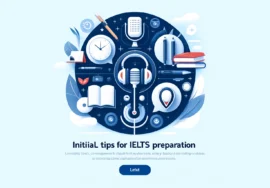Unlocking Your IELTS Speaking Score: A Guide to Band Descriptors
Master the IELTS Speaking test with this comprehensive guide to band descriptors. Discover key assessment criteria, decoding band levels, and actionable tips to boost fluency, vocabulary, grammar, and pronunciation for your desired score!
Unlocking Your IELTS Speaking Score: A Guide to Band Descriptors
Ever wondered how the IELTS examiner decides your Speaking score? It’s not magic! They use a clear set of criteria called “band descriptors” to assess your performance. Think of these descriptors as a detailed roadmap to success, guiding you towards your desired score and helping you unlock your full potential. This article breaks down these band descriptors in simple terms, helping you understand what the examiner is looking for and how to improve your speaking skills effectively.
What the Examiner Looks For: Key Assessment Criteria

The examiner assesses your speaking based on four main factors, each of which plays a crucial role in determining your score:
- Fluency and Coherence: Can you speak smoothly and continuously without too many hesitations or unnatural pauses? Are you able to link your ideas logically, making it easy for the listener to follow your thoughts and understand your message?
- Lexical Resource: Do you use a wide range of vocabulary that is both varied and appropriate for the topic? Can you select precise words to express your ideas and demonstrate an ability to paraphrase when needed?
- Grammatical Range and Accuracy: Can you use a variety of grammatical structures correctly and naturally? Are your sentences free from errors, and do you show flexibility in forming complex and compound sentences?
- Pronunciation: Is your pronunciation clear, natural, and easy to understand? Do you use appropriate intonation, stress, and rhythm to convey your message effectively and add emphasis where needed?
Understanding Band Scores: Decoding the Levels

IELTS Speaking scores are given in bands ranging from 0 to 9. Each band represents a specific level of proficiency, offering a clear picture of what the examiner is looking for. Here’s a closer look:
- Band 9 (Expert User): You speak effortlessly, with an extensive range of vocabulary and flawless grammar. Your pronunciation is impeccable, and you sound like a native speaker. Every aspect of your speaking is natural and highly effective.
- Band 8 (Very Good User): You speak fluently and confidently, with a strong range of vocabulary and mostly accurate grammar. While minor mistakes may occur, they do not hinder your ability to communicate effectively or impact the clarity of your ideas.
- Band 7 (Good User): You can communicate clearly and effectively, even if occasional limitations in vocabulary or grammar are present. You handle a variety of topics with ease and express your ideas coherently, showing flexibility in your language use.
- Band 6 (Competent User): You can communicate adequately in most situations, though you might struggle with more complex language or less familiar topics. Errors in grammar and vocabulary may occur, but they typically do not impede understanding.
- Band 5 (Modest User): You can convey basic information and participate in conversations, but frequent errors and limited fluency may make communication less effective. You may find it challenging to express yourself clearly on certain topics.
Using Band Descriptors for Self-Assessment: Know Your Strengths and Weaknesses

The band descriptors provide detailed descriptions of what each band level entails. By studying these, you can take charge of your preparation and tailor your practice to target specific areas:
- Analyze the Descriptors: Take time to read the band descriptors thoroughly, focusing on the specific criteria for each band level. This will give you a clearer understanding of what the examiner expects.
- Record Yourself: Practice speaking on a variety of topics and record your performance. Listening to these recordings allows you to evaluate your strengths and weaknesses objectively.
- Identify Areas for Improvement: Determine whether you struggle with fluency, vocabulary, grammar, or pronunciation. By pinpointing specific areas, you can create a focused and effective study plan.
Tips for Improving Your IELTS Speaking Score
To achieve your target score, consider these practical tips and strategies:
- Practice Regularly: Make speaking English a daily habit. Discuss diverse topics, including personal experiences, current events, and abstract ideas, to develop your confidence and adaptability.
- Expand Your Vocabulary: Learn new words and expressions every day. Incorporate these into your speech to make your language richer and more precise. Practice synonyms and paraphrasing to enhance your lexical range.
- Work on Grammar: Develop a balance between accuracy and variety in your grammatical structures. Aim to use a mix of simple, compound, and complex sentences while minimizing common grammatical errors.
- Enhance Pronunciation: Listen to native speakers through podcasts, videos, or conversations. Mimic their pronunciation, intonation, and rhythm to make your speech more natural and engaging.
- Engage in Mock Tests: Simulate the IELTS Speaking test with a partner or teacher. This will help you become familiar with the format and improve your ability to think and respond quickly.
- Seek Feedback: Work with a teacher or a language partner who can provide constructive feedback. Understanding your mistakes and receiving guidance is essential for growth.
Additional Practice Techniques
- Use IELTS Speaking Sample Questions: Practice answering past IELTS Speaking questions to get a sense of the types of topics and questions you might encounter.
- Join Speaking Groups: Participate in language exchange groups or online speaking communities. Engaging in real conversations will improve your confidence and fluency.
- Create a Speaking Journal: Record daily voice notes about your day or any topic of interest. Review these recordings weekly to monitor your progress and identify patterns in your mistakes.
- Focus on Pronunciation Exercises: Practice tongue twisters, shadowing exercises, and reading aloud to improve clarity and articulation.
Overcoming Common Challenges in IELTS Speaking

Many candidates face challenges when preparing for the IELTS Speaking test. Identifying and addressing these obstacles is crucial for improvement:
- Nervousness and Anxiety: Test anxiety can hinder your fluency and coherence. Practice relaxation techniques, such as deep breathing, and build your confidence through repeated mock tests.
- Limited Vocabulary: Expand your active vocabulary by learning topic-specific words. Group words into categories like travel, technology, or education, and practice using them in sentences.
- Time Management: In Part 2 of the Speaking test, you need to talk for 1-2 minutes. Practice organizing your ideas quickly and structuring your responses with a clear beginning, middle, and end.
Using Technology to Boost Your Preparation
Technology offers various tools to enhance your IELTS Speaking preparation. Here are some examples:
- Speech Recognition Software: Apps like Google Speech-to-Text can help you identify mispronunciations and improve your clarity.
- Language Learning Platforms: Websites and apps like Duolingo, Babbel, and Memrise offer vocabulary and grammar exercises tailored to different proficiency levels.
- Online Tutors: Platforms like iTalki and Cambly connect you with experienced tutors who can provide personalized feedback.
- YouTube Channels: Follow IELTS-specific channels for tips, sample answers, and test strategies to refine your skills.
Staying Motivated Throughout Your Preparation
Maintaining motivation can be challenging during a lengthy preparation period. Here are some strategies to stay focused:
- Set Clear Goals: Define your target band score and break it down into smaller milestones. Celebrate your achievements along the way.
- Create a Study Plan: Develop a schedule that includes daily speaking practice, vocabulary building, and mock tests.
- Join a Community: Connect with other IELTS candidates through online forums or study groups to share tips and experiences.
- Reward Yourself: Treat yourself after completing key milestones, such as mastering a challenging topic or improving your band score in practice tests.
Conclusion: Aim for Your Desired Score
By understanding the IELTS Speaking band descriptors, you gain valuable insights into what the examiner expects and how to meet those expectations. This knowledge empowers you to focus your practice on the areas that matter most. Remember, consistent effort and targeted practice are key to achieving success. Whether you’re aiming for a Band 6 or striving for Band 9, your journey starts with understanding your current abilities and committing to improvement. With dedication, feedback, and persistence, you can achieve the IELTS Speaking score you truly deserve and unlock countless opportunities for your future!








